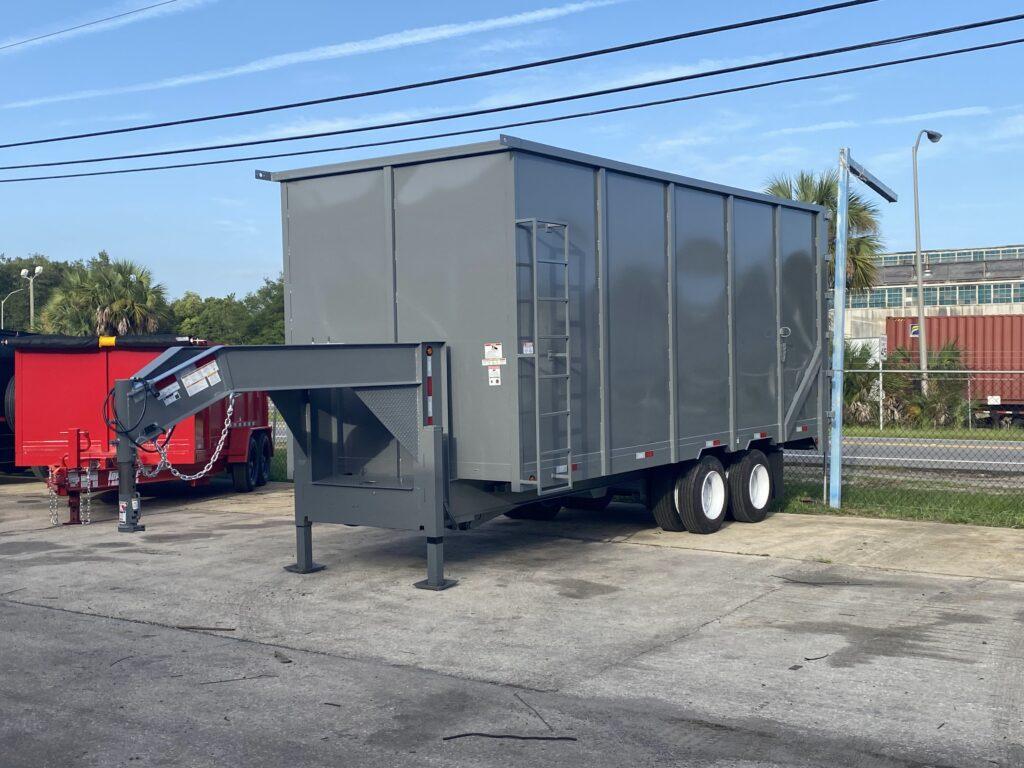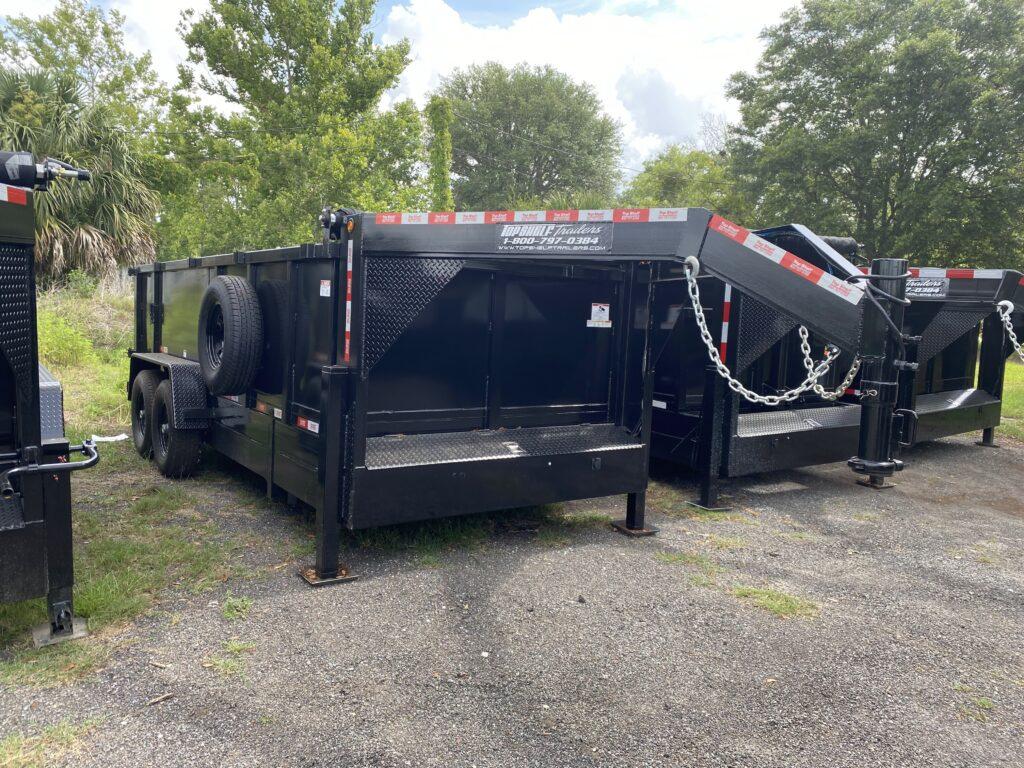Understanding the Benefits and Best Uses of a Gooseneck Dump Trailer for Your Hauling Projects
As a business owner or individual who regularly hauls large amounts of materials or equipment, it’s important to have the right tools for the job. One tool that can significantly improve your hauling capabilities is a gooseneck dump trailer. But is a gooseneck dump trailer the right choice for you? In this article, we’ll explore the benefits and best uses of gooseneck dump trailers to help you make an informed decision.

Table of Contents
- What is a gooseneck dump trailer?
- Benefits of using a gooseneck dump trailer
- Increased payload capacity
- Enhanced stability and maneuverability
- Efficient unloading
- Versatility in hauling different types of materials
- Durability and longevity
- Best uses for a gooseneck dump trailer
- Construction and landscaping projects
- Agricultural and farming applications
- Transporting heavy equipment
- Moving large volumes of materials
- Hauling debris and waste
- Factors to consider when choosing a gooseneck dump trailer
- Size and weight capacity
- Material and construction quality
- Type of dumping mechanism
- Hitch compatibility and towing vehicle
- Cost and maintenance
- Conclusion
- FAQs
1. What is a gooseneck dump trailer?
A gooseneck dump trailer is a type of trailer that is hitched to the bed of a pickup truck using a gooseneck hitch. The trailer has a hydraulic lifting mechanism that allows it to be tipped and emptied, making it a popular choice for hauling and unloading heavy materials such as rocks, sand, dirt, and construction debris.
2. Benefits of using a gooseneck dump trailer
Increased payload capacity
One of the biggest advantages of using a gooseneck dump trailer is the increased payload capacity it offers compared to other types of trailers. With a gooseneck hitch, the trailer can be attached closer to the center of gravity of the towing vehicle, which reduces the amount of weight that is transferred to the rear axle of the truck. This results in a higher weight capacity, which means you can haul more materials with fewer trips.
Enhanced stability and maneuverability
Gooseneck dump trailers also offer enhanced stability and maneuverability compared to other types of trailers. Because the trailer hitch is located in the bed of the truck, the weight of the trailer is distributed more evenly, which reduces the risk of sway or fishtailing when towing. This also makes it easier to maneuver the trailer in tight spaces or on uneven terrain.
Efficient unloading
The hydraulic lifting mechanism of a gooseneck dump trailer allows for efficient unloading of materials. Instead of having to manually shovel or unload materials from the trailer, you can simply raise the trailer and dump the contents using the hydraulic system. This saves time and labor, making the job easier and more efficient.
Versatility in hauling different types of materials
Gooseneck dump trailers are versatile in hauling different types of materials, including rocks, sand, dirt, gravel, construction debris, and even heavy equipment such as tractors and skid steers. This makes them a popular choice for a wide range of applications, from construction and landscaping projects to agricultural and farming applications.
Durability and longevity
Gooseneck dump trailers are typically built to withstand heavy use and tough conditions. They are constructed from high-quality materials such as steel or aluminum and are designed to last for many years with proper maintenance. This makes them
a cost-effective investment in the long run for those who frequently haul large amounts of materials or equipment.
3. Best uses for a gooseneck dump trailer
Construction and landscaping projects
Gooseneck dump trailers are commonly used in construction and landscaping projects for hauling materials such as sand, gravel, and rocks. The efficient unloading mechanism allows for easy dumping of materials, making it easier to complete projects in a timely and efficient manner.
Agricultural and farming applications
In agricultural and farming applications, gooseneck dump trailers are often used to haul heavy equipment such as tractors, harvesters, and hay bales. They can also be used to transport materials such as feed, fertilizer, and manure.
Transporting heavy equipment
Gooseneck dump trailers are also popular for transporting heavy equipment such as construction machinery, excavators, and skid steers. The increased payload capacity and stability of the trailer make it a safe and efficient choice for hauling large and heavy equipment.
Moving large volumes of materials
For those who need to move large volumes of materials such as debris, waste, or recyclables, gooseneck dump trailers can be a great option. They offer a high weight capacity and efficient unloading mechanism, making it easier to transport and dispose of large volumes of materials in a single trip.
Hauling debris and waste
Gooseneck dump trailers are also commonly used for hauling debris and waste from construction or demolition sites. The efficient unloading mechanism allows for quick and easy disposal of waste, making it easier to keep job sites clean and safe.

4. Factors to consider when choosing a gooseneck dump trailer
Before purchasing a gooseneck dump trailer, there are several factors to consider to ensure that you choose the right trailer for your specific needs. Some of the most important factors to consider include:
Size and weight capacity
Make sure to choose a trailer with a size and weight capacity that can handle the materials or equipment you need to haul. Consider the maximum weight capacity of both the trailer and the towing vehicle to ensure that you stay within safe weight limits.
Material and construction quality
Look for a trailer that is constructed from high-quality materials such as steel or aluminum to ensure that it can withstand heavy use and tough conditions. Check for weld quality, thickness of the metal, and other indicators of durability.
Type of dumping mechanism
There are several different types of dumping mechanisms available for gooseneck dump trailers, including scissor lifts, telescopic cylinders, and single or dual hydraulic cylinders. Consider which type of mechanism will be best for your specific needs.
Hitch compatibility and towing vehicle
Make sure that your gooseneck dump trailer is compatible with your towing vehicle and hitch type. Some trailers may require a specialized gooseneck hitch or additional equipment to ensure safe and efficient towing.
Cost and maintenance
Consider the cost of the trailer as well as ongoing maintenance costs such as regular inspections, repairs, and replacements. Choosing a high-quality trailer may require a larger upfront investment, but can save money in the long run through reduced maintenance and repair costs.
5. Conclusion
A gooseneck dump trailer can be a valuable investment for those who frequently haul large amounts of materials or equipment. With increased payload capacity, enhanced stability and maneuverability, efficient unloading, versatility in hauling different types of materials, and durability and longevity, gooseneck dump trailers offer a wide range of benefits for hauling projects. However, it’s important to carefully consider factors such as size and weight capacity, material and construction quality, type of dumping mechanism, hitch compatibility and towing vehicle, and cost and maintenance before choosing a gooseneck dump trailer.
6. FAQs
1. What is the difference between a gooseneck and a bumper pull trailer?
A gooseneck trailer is hitched to the bed of a pickup truck using a specialized gooseneck hitch, while a bumper pull trailer is hitched to the bumper of a vehicle using a standard ball hitch. Gooseneck trailers offer increased stability and maneuverability, as well as higher weight capacities, compared to bumper pull trailers.
2. What are the most common uses for a gooseneck dump trailer?
Gooseneck dump trailers are commonly used in construction and landscaping projects, agricultural and farming applications, transporting heavy equipment, moving large volumes of materials, and hauling debris and waste.
3. How do I choose the right gooseneck dump trailer for my needs?
When choosing a gooseneck dump trailer, consider factors such as size and weight capacity, material and construction quality, type of dumping mechanism, hitch compatibility and towing vehicle, and cost and maintenance.
4. Can I use a gooseneck dump trailer with a smaller pickup truck?
While gooseneck dump trailers offer higher weight capacities compared to bumper pull trailers, it’s important to make sure that your towing vehicle can safely handle the weight of the trailer and its contents. Make sure to check the weight limits of both the trailer and the towing vehicle before making a purchase.
5. How should I maintain my gooseneck dump trailer?
Regular maintenance is important for ensuring the longevity and safety of your gooseneck dump trailer. This may include regular inspections, cleaning, lubrication, and repairs as needed. It’s also important to follow manufacturer guidelines for safe use and maintenance of the trailer.

1 thought on “Is a Gooseneck Dump Trailer Right for You? Here are 5 reasons to consider”